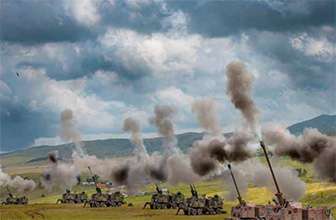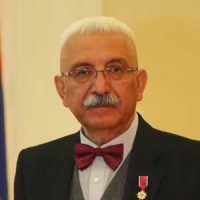
Armenia’s Five Stages of Grief  By Benyamin Poghosyan, PhD, Chairman, Center for Political and Economic Strategic Studies
By Benyamin Poghosyan, PhD, Chairman, Center for Political and Economic Strategic Studies
Todd Fabacher, Co-Founder, Distrikt Foundation, Gyumri
Countries, just like people, will experience the five stages of grief after a significant loss. 2020 was a challenging year for all nations. COVID – 19 pandemic and economic downturn have negatively impacted almost everyone. It was an exceptionally difficult year for Armenia because, besides the pandemic, defeat in the war launched by Azerbaijan against the unrecognized Nagorno Karabakh (Artsakh) Republic in autumn 2020 resulted in significant material and human losses. In the first half of 2021, Armenia grasped domestic political instability, triggering an early parliamentary election in June 2021. READ MORE
- EGF Editor |
Published on EGF: 11.08.2021
| Security
-
Assessing the Current Situation in the South Caucasus  By Alan Whitehorn, Professor Emeritus in Political Science, The Royal Military College of Canada
By Alan Whitehorn, Professor Emeritus in Political Science, The Royal Military College of Canada
Despite signing the November 9, 2020 ceasefire, Azerbaijan and Armenia have not been able to agree on an actual firm ceasefire. There are too many border incursions and military incidents, despite the existence of decades-old soviet boundaries between republics that were firmly regulated in the former Soviet Union. Peacekeepers are too few and not located in enough areas to address all of the border incidents. READ MORE
- EGF Editor |
Published on EGF: 07.07.2021
| Security
-
Military Aerospace Expertise and Exports from Israel  By Eugene Kogan, Tbilisi-based defence and security expert
By Eugene Kogan, Tbilisi-based defence and security expert
Local domestic military aerospace expertise has been honed over a period of almost 60 years. Israel’s procurement of US-built fighter aircraft and Israeli technicians and aeronautical engineers developing subsystems and avionics for the jets has enhanced their skills and expertise.
Rafael Advanced Defence Systems’ cooperation with Raytheon has taken military aerospace expertise to the next level. The triple combination of buying from the United States, developing subsystems locally, and teaming up with the US has contributed to successful arms exports from Israel. The Ministry of Defence International Defence Cooperation Authority (known as SIBAT) realised in November 2019 that the international arms market was undergoing serious changes and certain adjustments would be needed in order to remain competitive and increase the market share of Israeli defence companies. READ MORE.
- EGF Editor |
Published on EGF: 07.07.2021
| Security
-
Israeli-Greek Naval, Air Force and Defence Industry Cooperation  By Eugene Kogan, Tbilisi-based defence and security expert
By Eugene Kogan, Tbilisi-based defence and security expert
The bilateral Israeli-Greek military and defence industry cooperation was not created in a vacuum, but is a by-product of the steadily deteriorating Israeli-Turkish relations which include two important events: the famous World Economic Forum incident in Davos on January 29th, 2009 and the Mavi Marmara incident on May 31st, 2010. The Davos incident was further aggravated by the Mavi Marmara incident, which left ten Turkish citizens dead after clashing with Israeli commandos as the latter boarded the ship which was trying to break the Gaza blockade. Moreover, the military component of Israeli-Turkish relations, which used to be the backbone of the relations, is still missing and is unlikely to reappear in the near future. READ MORE.
- EGF Editor |
Published on EGF: 16.06.2021
| Security
-
Border Incident Forces Armenians to Rethink Relationship with Russia  By Benyamin Poghosyan, PhD, Chairman, Center for Political and Economic Strategic Studies
By Benyamin Poghosyan, PhD, Chairman, Center for Political and Economic Strategic Studies
The Azerbaijani military incursion into Armenian territory may have significant geopolitical implications. The muted reaction of the CSTO and Russia triggered another wave of anti-Russian sentiments in Armenia.
On 12 May 2021, news coming from the Syunik region shocked Armenian society. Several hundred Azerbaijani soldiers had crossed the Armenian border and penetrated up to 3.5 km into Armenian territory near the "Black Lake". The Armenian government did not confirm this immediately, however, late in the evening on the same day, Armenia’s Security Council convened in an extraordinary session, and the prime minister declared that Azerbaijani Armed forces had entered Armenian territory. READ MORE
- EGF Editor |
Published on EGF: 29.05.2021
| Security
-
Azerbaijan-Armenia Border Dispute – Could the Conflict Re-escalate?  By Fuad Shahbazov, Baku-based independent regional security and defence analyst
By Fuad Shahbazov, Baku-based independent regional security and defence analyst
Half a year after the Russian-brokered ceasefire agreement was signed between Azerbaijan and Armenia ending the 44-day war in Karabakh, peace in the complex region is not on the horizon. A new stage of discontent and harsh statements came last week after Azerbaijani Armed Forces reportedly crossed the border with Armenia in the Syunik province and advanced around 3 kilometres by Sev Lake. Yerevan dubbed this action as an explicit provocation and an attempt to occupy Armenian territory, whereas Baku denied the accusations, stating that Azerbaijani border guards established a military control point at the heights around the lake without advancing into Armenian territories. READ MORE
- EGF Editor |
Published on EGF: 21.05.2021
| Security
-
Polish-Romanian Defence and Security Policy  By Eugene Kogan, Tbilisi-based defence and security expert
By Eugene Kogan, Tbilisi-based defence and security expert
A joint initiative of Romanian President Klaus Iohannis and Polish President Andrzej Duda, known as the ‘Bucharest Nine', was launched in November 2015 and laid a foundation for foreign and security policy meetings and discussions. As the next step, the Warsaw NATO Summit in July 2016 accelerated military-to-military cooperation. As a result, the initiative brought Romanian troops to Poland and Polish troops to Romania on a rotational basis in March 2017. In addition, their pivotal positions in the east and in the south of NATO’s reach have further increased their cooperation in a variety of defence and security programmes. READ MORE.
- EGF Editor |
Published on EGF: 18.05.2021
| Security
-
The Causes of the Third Karabakh War  By Alan Whitehorn, Professor Emeritus in Political Science, The Royal Military College of Canada
By Alan Whitehorn, Professor Emeritus in Political Science, The Royal Military College of Canada
Just when you think the war is over, it actually is not. Multi-generational families are haunted by the dead. There are too many displaced persons, multitudes of refugee children uprooted from schools and homes, and continued mistreatment of POWs. The major economic dislocations and massive war debts are part of the ongoing and mounting negative tally. The competing legal terms national self-determination vs territorial integrity are brandished about in fervent ideological battles that further entrench the hardened positions of two combatant sides. READ MORE
- EGF Editor |
Published on EGF: 12.05.2021
| Security
-
Russia’s Peace Mission in Karabakh Provokes Reaction in Azerbaijan  By Fuad Shahbazov, Baku-based independent regional security and defence analyst
By Fuad Shahbazov, Baku-based independent regional security and defence analyst
As part of the 10 November ceasefire agreement that ended last year's 44-day war, a contingent of Russian soldiers was deployed to Karabakh as peacekeepers. However, the lack of a formally agreed mandate and perceptions of Russian overstepping has led to growing tensions between Baku and Moscow.
The second Karabakh war ended with the signing of a Russia-brokered ceasefire agreement and the deployment of Russian peacekeeping forces with the aim of preventing further hostilities and ensuring stability in the region. However, the ceasefire arrangements between Azerbaijan–Armenia on one side and Russia–Turkey on the other has left more questions than answers. The fact that there is still no formally agreed mandate for the Russian forces operating on the ground causes outrage in Azerbaijan as local authorities loudly criticise Moscow for provocative actions. READ MORE
- EGF Editor |
Published on EGF: 05.05.2021
| Security
-
The Karabakh War: The Lessons of Defeat in the Cyberspace  By Lieutenant-General (Ret.) Hayk S. Kotanjian, PhD, Professor Strategic Security Studies
By Lieutenant-General (Ret.) Hayk S. Kotanjian, PhD, Professor Strategic Security Studies
Reflecting on the lessons of the military aggression of Turkey and Azerbaijan against the Nagorno-Karabakh Republic and the Republic of Armenia, strategic analysts of the security institutions and processes continue to monitor the dynamics of the peace-war around Karabakh in the context of the world order transformation. Russian President Vladimir Putin at the session of the Russian Security Council of March 26, 2021, emphasizing the exceptional role of cybersecurity, pointed out the strategic priority of the development of the cyberspace resources management system. In general, this coincides with the assessments of the special significance of this security sector, voiced recently by the US President Joe Biden and Chinese President Xi Jinping. READ MORE
- EGF Editor |
Published on EGF: 07.04.2021
| Security
-
